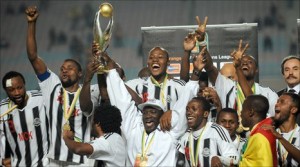
THE WORLD CUP is being played in Africa this year, and it’s about time. African players have been prominent in global club football for decades now -- as many as 1,000 of them play in Europe -- and only a bureaucratic inside job ensured that the 2006 tournament went to Germany when South Africa had been widely expected to get the nod from FIFA, the governing body of world soccer. In its embarrassment, FIFA promised the 2010 finals to Africa, and the growing excitement on the continent is palpable.
And yet African soccer’s progress on the playing field has been pathetic when you compare to the expectations that began to bubble in 1990, when a tough, attractive Cameroon team – led by the brilliant Roger Milla, a 38-year-old striker – charged to the World Cup quarter-finals after beating defending champions Argentina in the opening game of the tournament’s group stage.
Where I live, in Ireland, that 1990 Cameroon team is forever linked with our own postcolonial pinnacle. Ireland too made unprecedented progress that year, beaten narrowly, heartbreakingly, in the quarter-final by the host country, Italy. The Irish team even got to meet the Pope. The players returned home in triumph, hundreds of thousands filling Dublin city center to sing and cheer. The team captain was making a speech from a stage in front of the old parliament building when a rumor buzzed through the crowd: “Cameroon are beating England.”
Suddenly rivulets, then rivers, of Irish fans began to stream away from their own in-the-flesh heroes, in search of pubs with televisions to cheer a new set of heroes in far-away Naples, Africans who, conveniently, also wore green. “C’mon you boys in green,” we sang as we had for weeks, crowding around any visible screen, a new injection of adrenalin running through our veins after the national high of our own games. If the TVs had been loud enough to drown out our noise we could have heard the Neapolitans singing for the Cameroonians too.
Cameroon were 2-1 ahead with less than 10 minutes left, and they were all over the hated English. But the Africans missed a chance, and England went to the other end to win a penalty and equalize. England undeservedly won the game in extra time, and our hearts and hundreds of millions of other hearts all over the world were broken. Many of us comforted ourselves with the confident prediction that it was only a matter of time, and probably not much of it, before there was an African champion. Pelé himself said he expected it before the 1990s were through.
Nigeria have often looked the Africans most likely. In 1994, in the US-hosted World Cup, they met Italy in the first knock-out round after an impressively efficient group stage. I was at the game, near Boston, seated behind a group of Italians making fascist salutes. Despite my middle name (Mario), my Italian grandparents, my birthplace in Vicenza, I found it easy to cheer the Nigerians, as did most of the American crowd. A hugely talented team, led by two young midfield wizards, Jay-Jay Okocha and Sunday Oliseh, they were tactically super-cautious under the management of Dutchman Clemens Westerhof: they scored one goal and then toyed with the Italians when they could have been finishing them off. As the game clicked into injury time, and with Italy down to 10 men, Nigeria stupidly gave away possession and Italy charged upfield and scored. Extra time saw Italy score again and go through.
Read The Entire Article on our May/Jun 2010 Issue.



